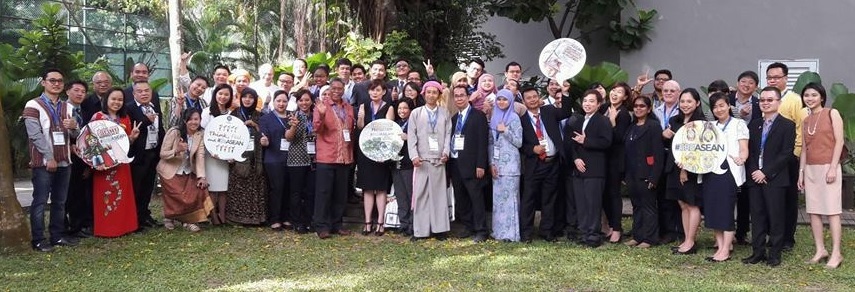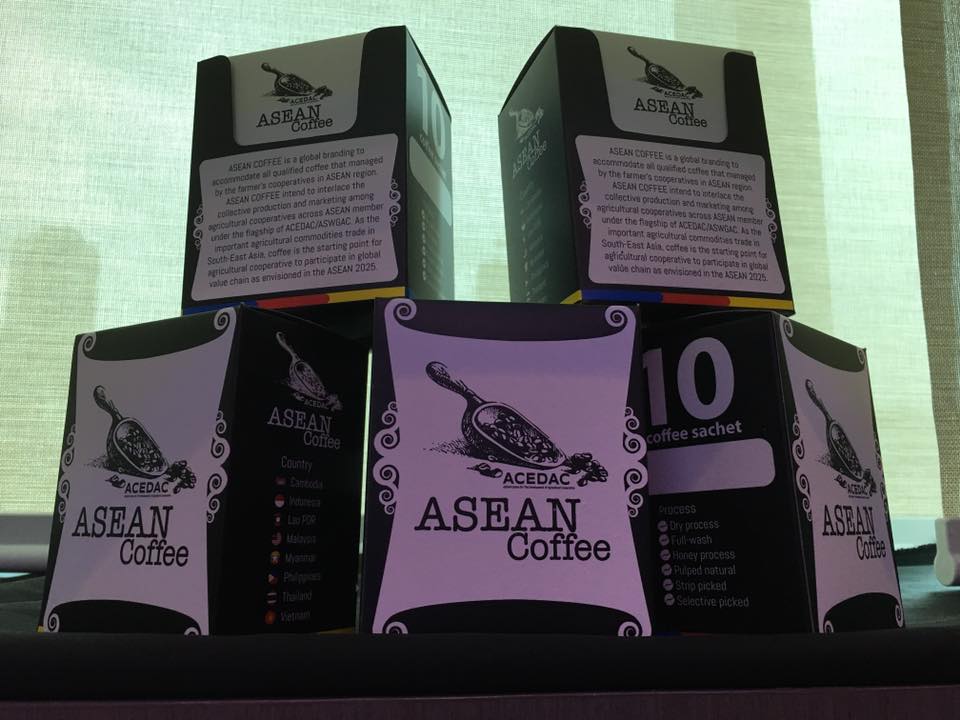Can you imagine how many people met over coffee to discuss problems and brainstorm on possible solutions? Likewise, PCBI believes that the coffee industry should focus on collaboration instead of competition.
Here’s a look at what PCBI has done and will be doing for peace and progress in the ASEAN region:
ASEAN COMMUNITY FORUM
One of these collaborations happened in Singapore on August 23-24, 2017, in time for the celebration of ASEAN’s 50th year. PCBI was invited by the ASEAN Foundation to be one of the four civil society organisations in the country which took part in the 2nd S Rajaratnam Endowment-ASEAN Community Forum.

Executive Director Elaine Tan welcomed the 42 participants from the 10 member states and encouraged them to make the ASEAN Community Blueprint 2025 more relevant and responsive to improve the lives of ASEAN citizens, specifically in sustainable development, environment protection, and disaster management.
 The two-day workshop gave the participants a profound understanding of what it is like to “think, feel, and be ASEAN” and the importance of unity to achieve sustainable development. In-depth conversations delved on challenges, best practices, and other opportunities for growth. PCBI shared its advocacy and learned from the experience of fellow civil society organisations in the region.
The two-day workshop gave the participants a profound understanding of what it is like to “think, feel, and be ASEAN” and the importance of unity to achieve sustainable development. In-depth conversations delved on challenges, best practices, and other opportunities for growth. PCBI shared its advocacy and learned from the experience of fellow civil society organisations in the region.
At the end of the workshop, ASEAN Secretariat’s Assistant Director and Head of Culture and Information Division Jonathan Tan lauded the efforts on sustainability by the participants in their respective countries.
A TASTE OF INDONESIA
A Green Bean and Blended Coffee Festival was held at Shangri-La Makati Hotel on November 21, 2017. The event was a joint partnership between PCBI and the Embassy of the Republic of Indonesia in the Philippines.
Ambassador Johnny Lumintang gave the welcome address, followed by PCBI President and Co-Chair Pacita Juan. Directors of PCBI were also present. Over cups of coffee, they engaged in meaningful discussions with café owners, F&B managers, instructors, roasters, cuppers, and other key players.

Indonesian coffee origins include Toraja, Bali Kintamani, Java, and Sumatra, while coffees from the Philippines highlighted Benguet, Matutum, and Sulu. Both Filipino and Indonesian attendees had fun learning more about each country’s coffee over piping hot brews.
ASEAN COFFEE CORNER
To increase the sustainability of coffee cooperatives and to improve livelihood of coffee farmers, the ASEAN Foundation’s ASEAN Foundation’s ASEAN Farmers’ Organisation Support Programme (AFOSP) forges connections not only among coffee cooperatives but also the private and public sectors in the ASEAN coffee industry.
PCBI worked with AFOSP Program Manager Yacinta Esti and her team to promote the ASEAN Coffee Corner, a side event of the 7th ASEAN Cooperative Business Forum held on January 16, 2018 at the Pan Pacific Hotel in Manila. It offered an opportunity for governments and cooperatives to have a better understanding of their coffees’ quality, so they can be part of its improvement in the coffee value chain. There was also a discussion to strengthen the cross-border trade for coffee in the ASEAN region, involving not only the producers but also the buyers.
ASEAN ACTIVITIES
The succeeding months will be a busy time, beginning with ASEAN Coffee Symposium (ACS) on March 23, 2018 at the Marina Bay Sands in Singapore. Organised by the ASEAN Coffee Federation (ACF), the ACS will be held in conjunction with the Café Asia 2018 and the International Coffee & Tea Expo 2018. With the theme “ASEAN: The New Frontier for Coffee,” Juan will share the essence of the ASEAN Women in Coffee. Right after the insightful sharing, a panel led by the ACF leaders will further boost the thought-provoking discussion.
 Another interesting activity to look forward to will be ACF’s third board meeting at the THAIFEX – World of Food Asia 2018 on May in Bangkok, Thailand.
Another interesting activity to look forward to will be ACF’s third board meeting at the THAIFEX – World of Food Asia 2018 on May in Bangkok, Thailand.
COLLABORATION, NOT COMPETITION
PCBI is happy to be part of all these fruitful partnerships. Coffee, after all, should continue to be a unifying beverage for Southeast Asians, and not just be a drink to satisfy our craving for caffeine. It is a way to help the environment as we plant more trees for future generations. It is also a way of preserving centuries-old traditions, embedded in our coffee culture. There can and should be unity in the diversity of our coffees.




